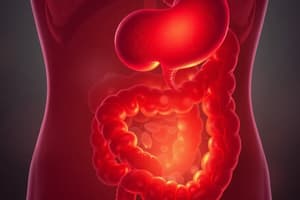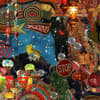Podcast
Questions and Answers
What does a patient with cholelithiasis and choledocholelithiasis undergo?
What does a patient with cholelithiasis and choledocholelithiasis undergo?
- Cholecystectomy and CBD exploration with T-tube placement (correct)
- Hernia repair
- Gastric bypass
- Appendectomy
What does post-operative cholangiography show?
What does post-operative cholangiography show?
- Complete stone clearance
- Residual stone (correct)
- Tumor
- No issues
How is mechanical flushing performed?
How is mechanical flushing performed?
- Mechanical flushing with water
- Mechanical flushing with heparinized saline (correct)
- Mechanical flushing with antibiotic
- Mechanical flushing with contrast
What is the timeline the doctor waits, in the Burhenne technique, to allow the T-tube tract to mature?
What is the timeline the doctor waits, in the Burhenne technique, to allow the T-tube tract to mature?
Which item is introduced through the T-tube tract into the bile duct during the Burhenne technique?
Which item is introduced through the T-tube tract into the bile duct during the Burhenne technique?
What is the next step in the Burhenne technique once the waiting period has passed?
What is the next step in the Burhenne technique once the waiting period has passed?
What size should the maximum stone size be for mechanical flushing?
What size should the maximum stone size be for mechanical flushing?
Which type of stone is targeted by contact dissolution?
Which type of stone is targeted by contact dissolution?
What substances are used for dissolution?
What substances are used for dissolution?
What is the purpose of using heparinized saline?
What is the purpose of using heparinized saline?
What does ERCP stand for?
What does ERCP stand for?
What is performed with ERCP?
What is performed with ERCP?
How is the stone extracted during ERCP with EST?
How is the stone extracted during ERCP with EST?
What is the initial surgical procedure a patient undergoes for cholelithiasis and choledocholelithiasis?
What is the initial surgical procedure a patient undergoes for cholelithiasis and choledocholelithiasis?
What device is used to remove stones during ERCP?
What device is used to remove stones during ERCP?
Which technique involves waiting for the T-tube tract to mature before removing stones?
Which technique involves waiting for the T-tube tract to mature before removing stones?
What intervention is used during ERCP?
What intervention is used during ERCP?
What is the correct amount of Heparinized saline?
What is the correct amount of Heparinized saline?
What size limitations of the stone is appropriate for extraction with a Dormia Basket?
What size limitations of the stone is appropriate for extraction with a Dormia Basket?
Flashcards
Mechanical flushing
Mechanical flushing
Mechanical flushing with heparinized saline (250ml saline with 25000 IU Heparin) through t-tube tract for 3 days; use for stone ≤1cm size.
Contact dissolution
Contact dissolution
Dissolution of cholesterol stones by monooctanoin or methyl tertiary butyl ether via T-tube.
Burrhene technique
Burrhene technique
Wait for 4-6 weeks to allow the T-tube tract to mature, then the T-tube is removed and the T-tube tract is dilated under fluoroscopic control, introduce Dormia Basket catheter through T-tube tract into the bile duct, and stone removed.
Choledoscopy
Choledoscopy
Signup and view all the flashcards
ERCP with EST
ERCP with EST
Signup and view all the flashcards
ECSWL
ECSWL
Signup and view all the flashcards
Laparoscopic/Open CBD Exploration
Laparoscopic/Open CBD Exploration
Signup and view all the flashcards
Study Notes
- A patient presenting with cholelithiasis and choledocholelithiasis can undergo lap/open cholecystectomy and CBD exploration with T-tube placement.
- Post-operative cholangiography may reveal residual stones.
Management of Residual Stones:
- Mechanical flushing with heparinized saline through the T-tube tract for 3 days can be a method, using 250ml of saline with 25000 IU of heparin (for stones ≤1cm size).
- Contact dissolution is another option specifically for cholesterol stones, achieved by dissolution with monooctanoin or methyl tertiary butyl ether via T-tube.
- The Burhenne technique involves waiting for 4-6 weeks to allow the T-tube tract to mature, followed by T-tube removal and T-tube tract dilation under fluoroscopic control, and introduction of a Dormia Basket catheter through the T-tube tract into the bile duct to remove the stone.
- Using a choledochoscope to pass through the T-tube tract and remove the stone.
- ERCP with EST (endoscopic sphincterotomy), stone extraction by Dormia Basket.
- ECSWL (Extracorporeal shock wave lithotripsy)
- Lap/open CBD exploration can be done.
Studying That Suits You
Use AI to generate personalized quizzes and flashcards to suit your learning preferences.





